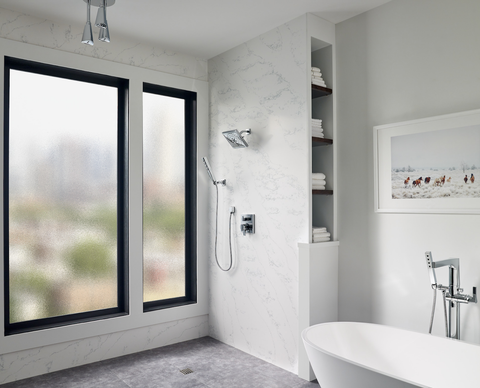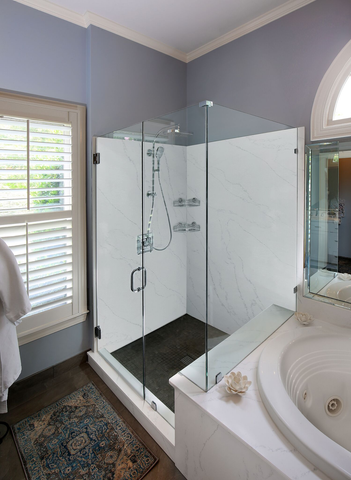Showers are an integral part of most bathrooms. Whether your shower is enclosed, part of a tub/shower combination, or part of a wet room, it’s likely to be a major component in the style of your bathroom, as well as its function.
To help maintain both good design and function for the space, it’s necessary to have some type of watertight covering over the shower walls. This can be achieved in several ways, but the most popular method is to use tile. Tile can give you a variety of styles and designs, but it comes with several drawbacks and disadvantages, as well.
Newer shower designs are beginning to make use of materials like quartz, a man made product composed of 90% quartz mixed with resins and pigments. Quartz slabs can be installed in any type or configuration of shower, and also have numerous styles, colors, and designs to choose from - many of which mimic natural stone like marble. They also have several advantages over tile used in the same space.
Consistency

Tile is a very general term used to describe any number of materials that have been cut or shaped into uniform pieces meant to go together in one installation. Tile may be ceramic, porcelain, stone, glass, or metal, and it may vary significantly in quality, thickness, surface texture, durability, and maintenance requirements.
Not all tile is ideal for use in a shower. Natural stone requires sealing in wet areas to prevent discoloration and in the case of some stones like Lagos Azul, may even disintegrate over time when subjected to running water. Ceramic tile may crack over time, which can lead to staining if the tile isn’t sealed as well.
Glass tile is easy to care for, but hand cut glass can result in sharp corners and can be difficult to clean, while color-backed glass requires specialty installation to prevent discoloration or chipping.
The bottom line is that tile is extremely variable, and not every tile you choose will give you consistent results in a wet area.
Quartz slabs are highly consistent in all the ways that matter. They’re uniform in thickness, durability, color, surface texture, and maintenance. You’ll always know what you’re going to receive with quartz slabs; a material that’s easy to care for, that isn’t going to be damaged or stained by the water or soap you use, and that isn’t going to change over time.
Grout
Grout is part of every tile installation. It serves a few purposes, such as protecting the edges of the tiles from cracking, absorbing movement in the walls, and sealing up the installation so water can’t get through.
Most grouts are made of Portland cement, mixed with additives, pigments, and sometimes sand. Grout is porous, and will absorb water and stains over time, unless it’s sealed on a regular basis. If there is too much movement in the shower, or if the grout becomes old and brittle, it can also crack or even fall out, necessitating repair.
While large format tiles can reduce the number of grout lines you have in a shower, it won’t eliminate them all. So, you’ll have to remain aware of the grout and its maintenance over the lifetime of the shower.
Quartz slabs are installed in one, larger piece per section of wall. The edges of the slabs are sealed using an epoxy caulking material that is far more flexible than grout that doesn’t stain, peel, or crack. So your shower will have smooth, clean walls without grout lines breaking them up and causing additional maintenance to the area.
Appearance

Tile comes in a wide range of colors, styles, and material. This allows you to customize the look of your shower surround and the rest of your bathroom. However, any tile installation will require grout, which creates a grid effect on the walls. This grid automatically makes the viewer aware of the size of the shower. This is why it’s usually recommended that you use large tiles in small spaces to help prevent this visual design drawbacks.
Quartz comes in a wide range of colors and styles, including those that look like marble. Because quartz slabs are installed without grout lines, quartz shower walls give you a smooth, sleek, and elegant look that works perfectly with modern, transitional, or traditional styles (depending on the color and what other elements you have in the room.)
Both, quartz and tile, materials can also be used outside of the shower to create a cohesive look in the space. Both can be used to create tub surrounds, for example. But quartz can also be used to create one-piece counter and tub surround tops, as well as thresholds for the room. For this reason, quartz countertops can be carried further through the design, unifying the space more.
Get a Better Shower Design with Quartz
Quartz makes elegant, beautiful additions to any part of the bathroom, including shower walls. Consider using quartz in place of tile to get a truly watertight, low maintenance, and beautiful surfaces in your bath. For more design ideas or info on using quartz in your bathroom, contact a Hanstone Quartz expert.

